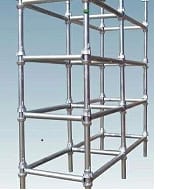Nithya Scaff
Nithya Scaff, Kottappuram Road, Near Thalikalamuri Auditorium, Aroor, Alappuzha, 688534
Since : 2022
Nithya Scaff, Kottappuram Road, Near Thalikalamuri Auditorium, Aroor, Alappuzha, 688534
Since : 2022
Couplers play a vital role in the construction industry, especially when it comes to joining steel reinforcement bars (rebars) in concrete structures. These mechanical devices, used to link rebar lengths, ensure the structural integrity of a project by providing a secure and efficient connection. In Alappuzha, there are several manufacturers specializing in couplers, providing construction companies with durable and reliable products that meet industry standards.
This article explores the role of couplers manufacturers, their significance in construction projects, and the expectations of customers looking for these products in Alappuzha. We will also cover the types of couplers available, the factors to consider when choosing a manufacturer, and the benefits of using high-quality couplers in construction. Couplers manufacturers are companies that design, produce, and supply couplers used to connect reinforcement bars (rebars) in concrete structures. The couplers come in various designs and sizes to meet the requirements of different construction projects. They are essential in ensuring that the rebars are securely connected, contributing to the stability and strength of the structure.
Nithya
Scaff
Alappuzha
Coupler Manufacturing Co.
Southern
Couplers
Prime
Scaffolding & Coupler Works
Kochi
Coupler Solutions
Kerala
Scaffolding & Coupler Suppliers
Sunrise
Couplers
Modern
Coupler Industries
VJ
Scaffolding & Coupler Solutions
Alappuzha
Construction Couplers
Coupler Manufacturers
are companies that produce couplers, which are devices used to connect
two elements, such as rods, pipes, tubes, or other structural components. In
the construction, automotive, and industrial sectors, couplers play a crucial
role in ensuring the secure and efficient joining of various materials.
A coupler is a mechanical device used to join
or connect two parts, either temporarily or permanently, while ensuring
stability, strength, and proper alignment. Couplers are commonly used in:
Forged couplers are essential components in
scaffolding systems, ensuring the stability and safety of temporary structures
in construction projects. Whether it's for large-scale commercial construction
or smaller residential projects, forged coupler manufacturers offer durable,
high-strength scaffolding accessories that are crucial for worker safety and
project success.
Why Choose Forged Couplers?
Forged couplers are preferred in many construction
projects due to their strength and reliability. Compared to pressed or welded
couplers, forged couplers offer:
Types of Forged Couplers Available
Forged coupler manufacturers offer various types of
couplers designed to meet different scaffolding needs, including:
Key Benefits of Working with Forged
Coupler Manufacturers
When choosing a forged coupler manufacturer, it's
important to ensure they offer the following advantages:
Wing Nuts
are fastening devices commonly used in construction, especially in formwork
systems. Wing nuts are designed with two "wings" that allow for
easy manual tightening and loosening without the need for tools. This makes
them highly convenient for quick assembly and disassembly in formwork and
scaffolding applications.
Wing nut manufacturers produce standard and customized
wing nuts made from high-strength steel or other durable materials,
ensuring that they can withstand heavy loads and constant pressure. These wing
nuts are primarily used in conjunction with tie rods in formwork to
provide a strong and stable system for pouring concrete.
Key Features Offered by Wing Nut
Manufacturers:
Types of Wing Nuts Available
Wing nut manufacturers produce various types of wing
nuts, suitable for different applications:
Q1: What is a coupler, and why is it
important in construction?
A1: A coupler is a device used to connect two tubes, rods, or other
structural elements in scaffolding and formwork systems. It ensures the
stability and safety of temporary structures during construction. Couplers play
a crucial role in creating strong joints that can withstand heavy loads and
environmental stresses.
Q2: What is the difference between a
forged coupler and a pressed coupler?
A2: Forged couplers are made by heating and shaping metal, resulting in
stronger and more durable couplers that can handle heavier loads. Pressed
couplers are manufactured using a pressing process, which makes them more
lightweight and suitable for lighter applications. Forged couplers are
generally preferred for heavy-duty scaffolding systems due to their superior
strength.
Q3: What are the common types of forged
couplers?
A3: Common types of forged couplers include:
Q4: How are wing nuts used in formwork
systems?
A4: Wing nuts are used to tighten or loosen tie rods in formwork
systems, ensuring that the formwork holds securely while concrete is being
poured. Once the concrete has set, the wing nuts are manually loosened to
disassemble the formwork. Their ease of use makes them ideal for quick assembly
and disassembly in construction projects.
Q5: What materials are used in the
production of wing nuts?
A5: Wing nuts are typically made from high-strength steel, galvanized
steel, or zinc-coated steel to provide maximum durability and
resistance to corrosion. These materials allow wing nuts to handle the heavy
loads applied in formwork systems.
Q6: What should I look for when choosing a
forged coupler manufacturer?
A6: When choosing a forged coupler manufacturer, consider factors such
as:
Q7: How can I ensure the quality of
couplers used in scaffolding?
A7: To ensure the quality of couplers, make sure they are sourced from a
reputable manufacturer with certifications. Additionally, regular
inspections of the couplers on-site for signs of wear, corrosion, or damage can
help ensure their continued reliability.
Q8: Can wing nuts be reused in multiple
projects?
A8: Yes, wing nuts made from high-strength materials can be reused
across multiple projects as long as they are well-maintained and not subjected
to excessive wear or corrosion. Regular inspections are essential to ensure
their continued functionality.

Alappuzha, Aroor

Alappuzha, Aroor